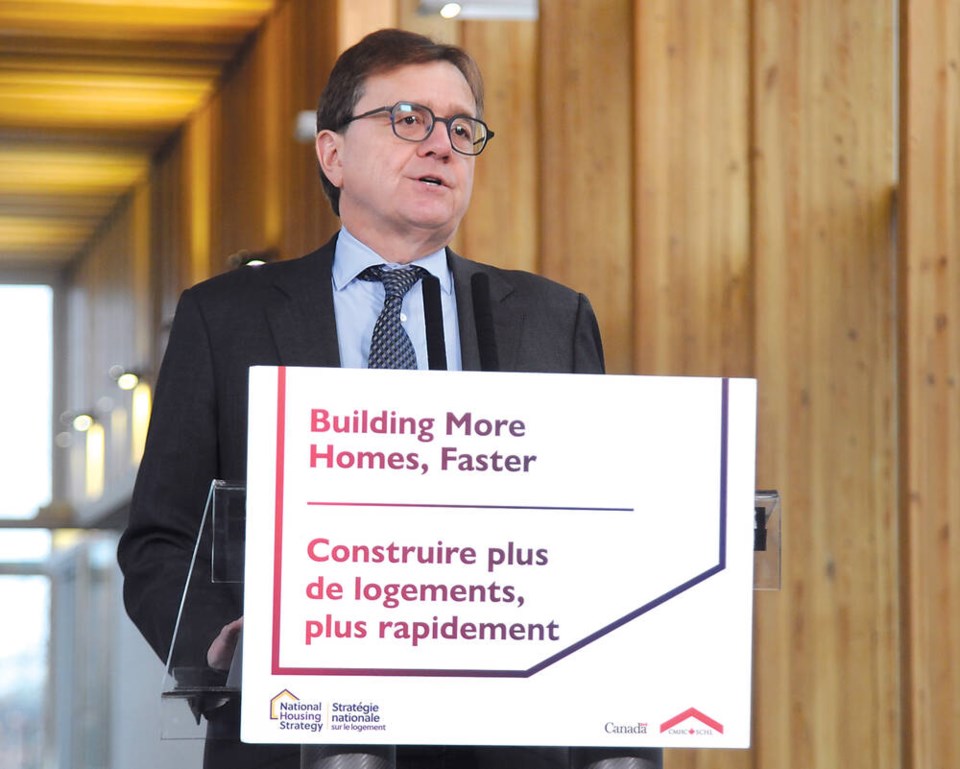The federal government is chipping in $18.6 million to help the City of North Vancouver pick up the pace of development.
Jonathan Wilkinson, North Vancouver Liberal MP and Natural Resources Minister, made the announcement in municipal hall on Friday.
The money comes from the $4 billion housing accelerator fund the feds have set up to assist municipalities that have committed to accommodating faster growth. The government intends for the program to spur the construction of 650,000 new homes across the country over the next 10 years over and above what the private sector would be expected to deliver on its own.
Mayor Linda Buchanan welcomed the funding, calling it an “energizing” day in the city.
“We all know that we need more housing here in the City of North Vancouver and frankly, in every community across Canada,” she said. “We know that the demand for housing options is real across the spectrum. People want to stay within their communities and we can make this possible by accelerating housing delivery. Our cities and our economy cannot survive otherwise. People and families cannot wait any longer. The consequences are real and are being felt by far too many.”
Cutting red tape might seem inexpensive, at least in theory, but Buchanan said there is a lot of logistical work to be done at the planning level.
Some of the projects the cash is earmarked for include a revamp of the city’s zoning bylaw to make it less exclusionary with built-in affordability measures, the allowance of multiplexes with four, six, or eight units on single-family lots, pre-zoning land for higher densities near the urban core and transit, a review of parking requirements, clearing the way for more mass timber construction, streamlining the application process and improving the technology at the front end, allowing some functions to be automated and deeper study of the city’s servicing needs.
Over the first three years, the program should add 530 new units over and above the city’s average of approximately 1,350 annually, and 3,100 new homes in the city over the next 10 years.
“That is the end goal,” Buchanan said. “Homes built faster.”
Wilkinson acknowledge that the prospect of home ownership is getting farther and farther out of reach, especially for young people. The housing accelerator program is intended to build on the 150,000 new affordable homes funded under the national housing strategy, Wilkinson said, as well as the government’s efforts to incentivize construction of new rental housing – most recently, removing GST from the construction costs.
“This changes the equation. Home builders will get more shovels in the ground and build new and needed rental homes that will drive down the cost of rent,” he said. “It is not a short-term challenge. It is going to take time. It is unfortunate, but federal governments of all political stripes were out of the housing game for almost 30 years.”
Academics and development industry members have started to voice concern that with Canada’s immigration targets of almost 1.5 million new permanent residents over the next three years, no amount of acceleration in housing will meet the growing demand.
Wilkinson said the government has already moved to reduce the number of student visas the government will grant and that, despite the pressing housing demand, Canada’s economy still needs immigrants to shore up the aging labour force.
“It’s both. It’s not one or the other,” he said.
Getting people into homes is one thing. Getting people around is another. Asked about funding commitments for expansion of Metro Vancouver’s transit system, Wilkinson said the government is very supportive of the TransLink Mayors’ Council’s plans for the region.
“I look forward to being able to talk about that perhaps a little later down the road,” he said.




